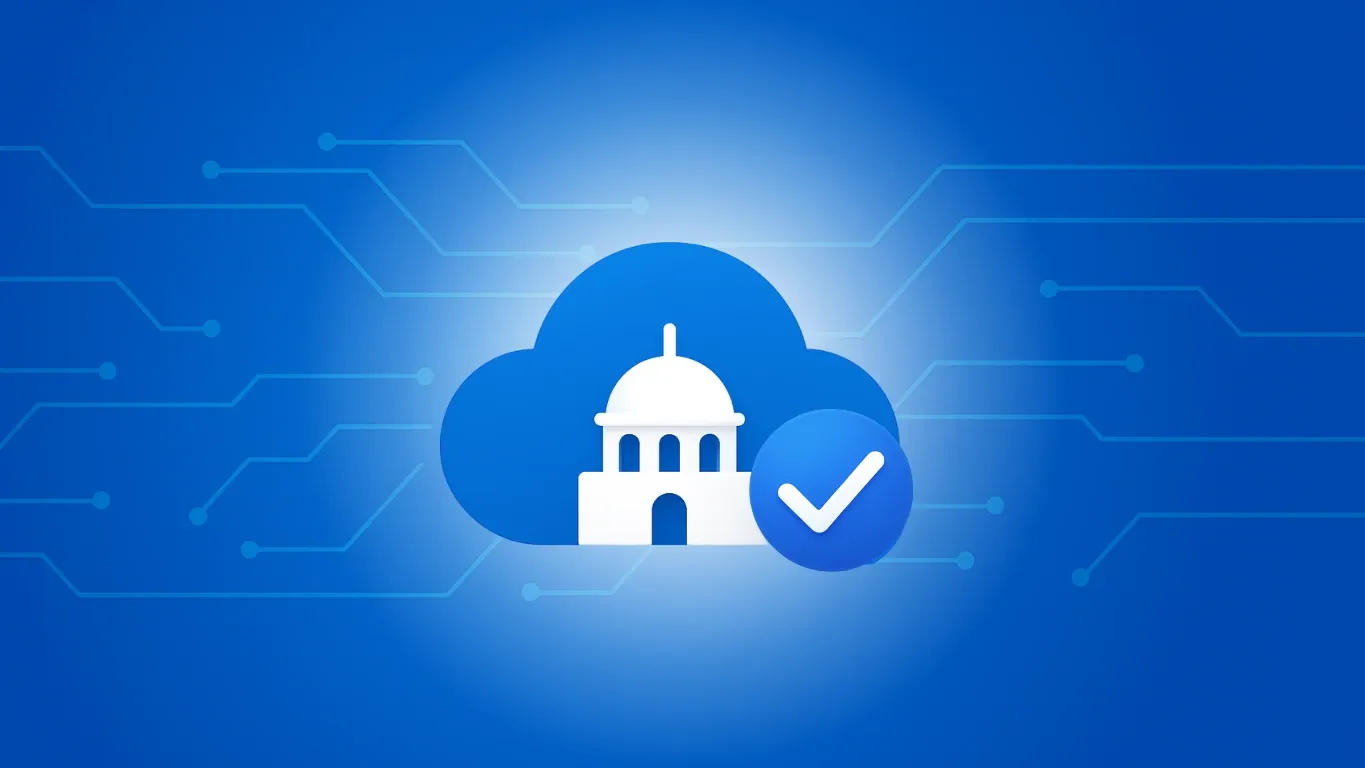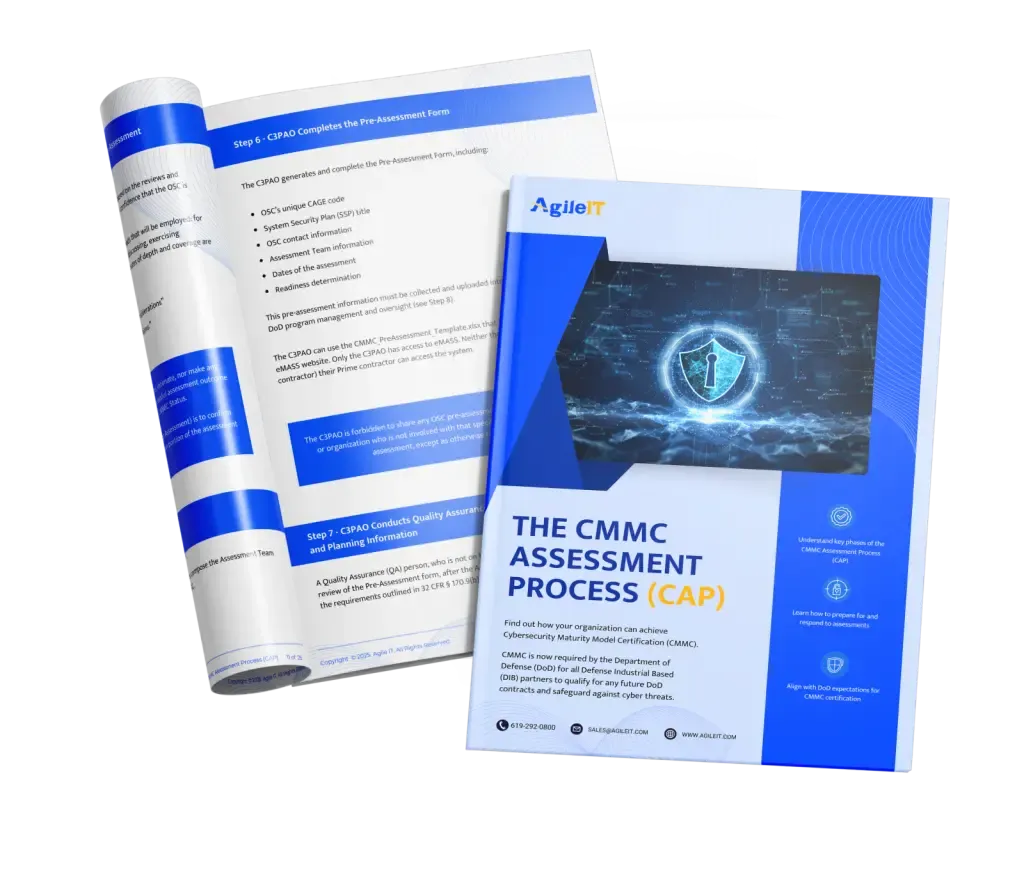Getting GCC Validation
Need Microsoft GCC High for CMMC, ITAR, or DFARS? This step-by-step guide explains the validation process, eligibility requirements, and how Agile IT can help you get approved.
We recommend a new or improved page:
Prepare & Validate for GCC & GCC HighUpdated guidance, new Microsoft form, and licensing information

Data security is one of the greatest concerns to federal agencies and contractors. During the CMMC Ecosystem Implementation Conference in Las Vegas this past May, Katie Arrington, acting DoD CIO, stated the non-kinetic events targeting the USA is significantly increasing and those of us who serve our nation need to be even more diligent in protecting our digital assets. The Defense Industrial Base needs to be as diligent as the Department of Defense (DoD). The federal government leverages Government Community Cloud (GCC) to ensure security within the federal ecosystem. Here is everything you need to know about acquiring GCC validation.
If you are looking for GCC High validation, check out our comprehensive GCC High Guide.
What Is GCC Validation?
GCC is a secure version of Office 365 built by Microsoft for government entities, vendors, and contractors. This version of Microsoft 365 introduces modern innovations and capabilities found in commercial cloud computing platforms to sensitive government systems.
GCC is easy to switch to because it has the same suite of features that you’re already used to from Office 365. The major difference is that GCC uses data centers that are only located within the continental United States, as required by FedRAMP standards.
Microsoft is continually evolving the product. In 2022, they upgraded it to support DFARS 252.204-7012, the compliance controls required for non-export controlled Controlled Unclassified Information (CUI) to GCC.
Think of GCC as a means for government agencies to consistently adopt commercial cloud solutions offered by cloud service providers while maintaining compliance with federal requirements.
How Is GCC Different from GCC High?
Given the recent government data breaches, choosing the right Microsoft GCC for your business is important. The Microsoft government cloud to choose from is either GCC or GCC High. To make the right choice, you’ve got to understand the difference between them. However, before highlighting the difference between GCC and GCC High, it’s only right that we first examine what GCC High is.
GCC High
What makes GCC High different from GCC is the additional security/safety precautions and the fact that it can handle export-controlled data. However, these extra security requirements mean you will find that many cloud features and functionalities are unavailable within GCC High. This is because every new feature that’s added to Microsoft must first be vigorously tested by the DoD and GCC High Clouds. In some cases, such as with popular tools like Azure Sentinel, Cloud App Security, and Microsoft Defender, functionality is rebuilt from the ground up for GCC High. This illustrates the high priority that compliance and safety requirements take for GCC High.
GCC vs GCC High: Compliance Support in 2025
The compliance landscape has evolved significantly. Here’s what each platform supports as of 2025:
GCC Supports:
- FBI Criminal Justice Information Services (CJIS)
- FedRAMP Moderate
- DoD SRG Level 2
- DFARS 252.204-7012 (for non-export controlled CUI)
- CMMC 2.0 Level 1 and Level 2 (for appropriate use cases)
GCC High Supports:
- FedRAMP High
- DoD SRG Level 5 and 6
- DFARS 252.204-7012 (including export-controlled data)
- International Traffic in Arms Regulations (ITAR)
- Export Administration Regulations (EAR)
- CMMC 2.0 All Levels
- Handling of all types of Controlled Defense Information (CDI)
CMMC 2.0 and Your Cloud Choice
CMMC 2.0 was introduced in November 2021. Its requirements are anticipated to begin appearing in DoD contracts in the third or fourth quarter of 2025. With these updated requirements, your choice of cloud platform is even more important than before. For a detailed look at CMMC requirements, download our whitepaper: What is CMMC Compliance?
Here’s what you need to know:
- CMMC Level 1: Can be achieved with GCC for companies that only handle Federal Contract Information (FCI)
- CMMC Level 2: Microsoft recommends GCC High for organizations pursuing Level 2; however, if you don’t handle export-controlled data, GCC may suffice
- CMMC Level 3: Requires GCC High
CMMC 2.0 is currently undergoing a phased rollout that will be complete in 2028. However, many prime contractors are already requiring that their subcontractors be compliant.
Who Can Qualify for GCC?
State, local, federal, and tribal governments can all qualify for GCC installation and usage. GCC is meant for individuals and organizations that have clearance to access secure data on CONUS servers. Commercial private entities with data subject to regulations also qualify for GCC.
Accepted government data types include:
- Controlled Unclassified Information (CUI) - non-export controlled
- Department of Defense Unclassified Controlled Nuclear Information (UCNI)
- Department of Energy UCNI
- Criminal Justice Information (CJI)
- Department of Defense Impact Level 2 Data
- Federal Contract Information (FCI)
- Other types of data that require Azure Government
How to Get GCC Validation
To begin your migration to Microsoft GCC, you will need to start with a validation process. This is similar to the process for GCC High validation. For you to be approved for GCC for CSP, you should be enrolled in the CSP program. Once you are a member of the CSP program, you will be approved only if you:
- Provide services or solutions to the US government either through direct or indirect contracts
- Serve US government customers through GSA or other contract vehicles
- Have partnered with the federal, state, local, or tribal government
Once you meet these prerequisites, the validation process is relatively straightforward:
- Request validation: Simply contact Microsoft to request validation as a Category 2 entity.
- Provide documentation: Submit a signed contract or sponsor letter to prove your eligibility.
- Acquire GCC licensing: Work with an AOS-G Partner to help with the licensing request.
The process typically takes between 3 to 7 business days for straightforward cases. To ensure this timeframe is achieved, start by filling out this general validation form.
Important Considerations
- To ensure that your application is successful, there are considerations that you should make, including:
- The contract submitted must include the controlled data type that you intend to handle.
- If you partner with a subsidiary for government contracts, you must apply using the business name on the contracts.
- Multi-national organizations must use a US address.
- Complex cases may take longer than the standard timeframe.
Benefits of GCC Validation
Getting GCC validation can be quite beneficial to your organization:
- Efficient operations on a vertically scalable platform
- Ready to host enterprise applications
- Faster delivery of public services
- Reduced Total Cost of Ownership (TCO)
- Best-in-class security with regular backups
- Platforms to roll out emerging technologies
- Compliance with federal requirements
To maximize these benefits while ensuring robust security, consider AgileDefend, our comprehensive cloud-managed services and security solution designed specifically for government contractors.
Looking Ahead: CMMC Timeline
As the Defense Industrial Base prepares for CMMC implementation:
- Q3/Q4 2025: CMMC requirements begin appearing in select DoD contracts
- 2025–2028: Phased rollout across all applicable contracts
- By 2028: Full implementation expected
Organizations should begin preparation now, as it typically takes 12–18 months to achieve CMMC Level 2 compliance. Our AgileThrive solution helps organizations streamline their journey to CMMC compliance with expert guidance and proven methodologies.
Learn More About GCC Validation
Once you have GCC validation, you can optimally utilize your IT resources for flexible workloads while maintaining increased uptime. You have the assurance that your cloud infrastructure remains compliant with federal requirements.
The question is no longer whether to choose GCC or GCC High, but rather which platform best fits your specific compliance needs. Given the recent updates to GCC’s capabilities, many DoD contractors now have access to cost-effective options that meet their needs without the additional expense of GCC High.
With the recent updates to GCC’s capabilities, many organizations now have a cost-effective option that meets their security requirements without the overhead of GCC High. If you are looking to license, implement, or migrate to GCC or GCC High, or want assistance in meeting government mandates for data governance and security, Agile IT can help. Contact us today to learn how.






